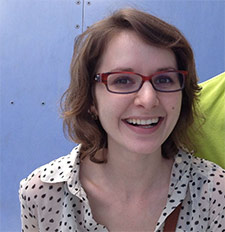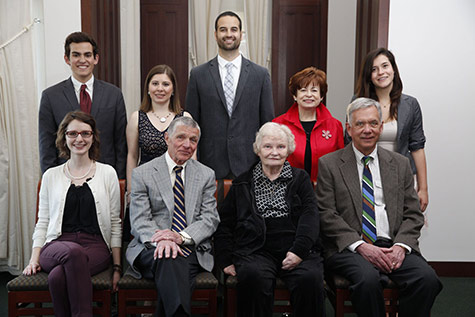
Every Thursday morning, Washington University in St. Louis senior Alaina Smith serves survivors of domestic violence. And every Thursday night, she helps its perpetrators.
“It is an intense day,” said Smith, a student of anthropology, public health and women, gender and sexuality studies. “But I want to practice what I am learning. I view all of these experiences as completing, extending and challenging the education. I’ve learned so, so much.”
Smith is one of seven recipients of the 2014 Gerry and Bob Virgil Ethic of Service Award. The annual honor is given to members of the WUSTL community who have donated their time and resources to improving the St. Louis region.
To learn more about the other award winners honored this week, visit here.
Jami Ake, assistant dean in the College of Arts & Sciences, said Smith’s work as court advocate with the St. Louis County Domestic Violence Court and as a facilitator at RAVEN, a batterer intervention program, demonstrates Smith’s willingness to tackle society’s toughest problems.

(Credit: WHITnEy Curtis/WUSTL Photos)
“Alaina is one of those tremendously intellectually engaged students who is not at all satisfied with the theoretical answers to problems or with learning that remains solely within the boundaries of a classroom,” Ake wrote in her nomination. “It has been her work outside the classroom — or more precisely, her way of bringing the classroom into the community and the community into the classroom — that has made such a profound impact on both the Washington University community and St. Louis.”
At the county court, Smith helps petitioners file orders of protection against partners or stalkers and connects them to community resources. Most importantly, Smith listens.
“I always start by asking, ‘How are you doing?’” Smith said. “Sometimes they just need to talk about how they are afraid and unsure. And often they are angry at how surprisingly complicated the process can be.”
Smith knows it’s easy to make assumptions about her clients — that they are weak or somehow to blame for their troubles. But Smith has learned these situations are complicated. Take, for instance, the woman who chose to drop her order of protection against her ex-husband. She wanted to be better prepared in case he retaliated violently. So Smith worked with her to devise an emergency safety plan.
“She told me she always sleeps on the couch so she could protect her kids if he should come in,” Smith said. “So we discussed what room she would go to if that happened. You want to avoid the kitchen because there are knives. You want to avoid the bathroom because there are hard surfaces. You want to think about all of these things, like: Do your children know how to call 911? I would never assume I know what’s best for them. These women are incredibly smart and strategic, often for the sake of their children.”
At RAVEN, Smith helps the men who cause such fear. She co-facilitates a weekly group for seven men, most of whom the court ordered to attend. Through education and discussion, RAVEN tries to undo a lifetime of destructive habits and beliefs.
“We teach that we always have control over our actions — that anger is an emotion, but violence is a choice,” Smith said. “It sounds strange, but we empower the men to make healthier decisions. Needless to say, not everyone wants to be there, and it takes time for these messages to sink in.”
The program typically takes 17 months to complete. Many drop out. But others change.
“When many of the men start, they will say things like, ‘She started it,’ or ‘I didn’t hit her that hard,’ or ‘The kids weren’t around,’” Smith said. “At the end, they aren’t making excuses. They know it doesn’t matter what she was doing; they own what they’ve done.”
The work is challenging but not dangerous, Smith said. A co-facilitator is always present, and the men typically are on their best behavior, she said.
“People are scared for me a lot, but the bigger battle is to get the men to drop their facade of, ‘I’m cool, calm and collected,’ and get them to be honest,” Smith said. “There have been times when I have felt disrespected, but those cases are more the exception. I believe truly that people, at their core, are good.”
Originally from the Boston area, Smith has adopted St. Louis as her home. Since her arrival as a freshman, she has volunteered in the community. She has provided child care at the Women’s Safe House, tutored elementary school students at Niños Youth Mentoring and fostered cats for Stray Rescue.
On campus, she has worked for the Community Service Office, staged
“The Vagina Monologues” and served as co-president of GlobeMed, spearheading the group’s partnership with a grassroots nongovernmental organization in Uganda.
Smith plans to stay in St. Louis after graduation and would like to work in a communications or outreach capacity at a nonprofit service agency.
“I love this city and have some deep roots here now,” Smith said. “When I came to Wash. U., I was interested in learning about the structural inequalities in other countries. But now I see those things exist in our own communities. I just feel so grateful for all of the mentors who have given me the opportunities to get involved right here.”